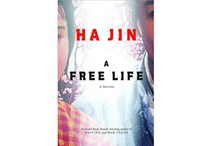A Free Life
By Ha Jin
672 pages;
Pantheon
Nan Wu, the main character in Ha Jin's novel A Free Life (Pantheon), is a Chinese immigrant with a wife and son who has made good on the American Dream but who wishes he were a poet instead. He is intensely literary, and late in the book, suffering with dental problems, he recalls Nabokov's comically misunderstood (and similarly afflicted) scholar, Pnin, another èmigrè from tyranny. Jin's evocation of Nabokov is an apt one to cap this long and lovely book, for it was the Russian Nabokov, writing in alien English, who showed us how peculiar America looks to its many resident strangers. Ha Jin, too, has written all his novels in English. A Free Life is the first set predominantly in the United States rather than Ha Jin's native China, and he portrays American life with an edge of surprise and weirdness. The prose is pared down, almost childlike, with a calculated simplicity that mimics the immigrant's consciousness facing life in a bizarre new place. Yet despite its plain surfaces, the story accumulates a stealth complexity: The Wus' marriage, for instance, evolves from a stoical joint commitment to betterment into something far more tender and emotionally vital. The idea of freedom, too, proves nuanced: Even as a dissident in exile, Wu feels imprisoned, not freed, by his American journey toward prosperity. He wants to be a writer, and after many years makes himself one—the book ends with a marvelous epilogue of Wu's journals and poems. The freedom he seeks is the freedom of art, more radical and dangerous than the merely political, and one Ha Jin has confronted with powerful results.
— Vince Passaro


